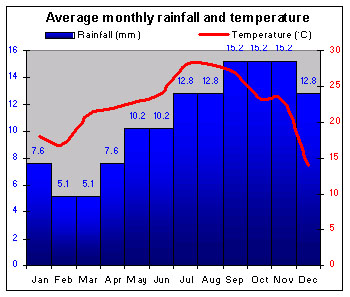COUNTRY INFORMATION |
Introduction |
Part of the Leeward Islands chain, Antigua was in turn a Spanish, French, and British colony. British influence is still strong and most clearly revealed in the Antiguans' passion for cricket. Antigua has two dependencies: Barbuda, 50 km (30 miles) to the north, sporting a magnificent beach; and Redonda, 40 km (25 miles) west, an uninhabited rock with its own king. |
|
Climate |
 |
Antigua is less humid than other Caribbean islands. Year-round trade winds moderate the heat. |
|
People |
| Languages |
English, English patois |
|
| URBAN/RURAL POPULATION DIVIDE |
|
|
|
Most of Antigua's population is descended from Africans, brought over between the 16th and 19th centuries. There are, in addition, a few Europeans and South Asians. Racial tensions are few. Life is based around the extended family. Since the 1960s the status of women has risen as a result of their greater access to education, and many are now entering the legal, financial, and medical professions. By Caribbean standards, wealth disparities are small. |
|
Economy |
| GNP (US$) |
642
|
M |
GNP World rank |
165
|
|
| Inflation |
2 |
% |
Unemployment |
7 |
% |
|
StrengthsTourism and construction of tourist hotels and infrastructure. Financial and communications services linked to offshore financial sector. WeaknessesVery little diversification makes Antigua vulnerable to downturns in the world tourism market. Evidence of offshore money laundering harms the country's reputation. |
|
Politics |
| Lower house |
Last election |
1999 |
Next election |
2004 |
| Upper house |
Last election |
1999 |
Next election |
2004 |
|
Antigua's multiparty democracy has been dominated for four decades by the Bird family. Vere Bird Sr., the veteran prime minister and ALP leader, retired in 1994, and a battle between his two sons to succeed him was won by Lester Bird; his elder brother Vere Jr. had in 1990 been removed from public office, accused of involvement in gun-running. Lester Bird led the ALP into its sixth consecutive term in 1999. |
|
Resources |
|
|
| Oil reserves (barrels) |
No data |
Oil production (barrels/day) |
Not an oil producer |
|
Antigua has no strategic or commodity resources and has to import almost all its energy requirements. |
|
Health |
| Life expectancy |
74 |
Life expect. World rank |
45 |
| Population per doctor |
877 |
Infant mortality (per 1000 births) |
16 |
|
|
|
| Principal causes of death |
Heart and respiratory diseases, cancers |
|
By Caribbean standards, the health system is efficient, with easy access to the state-run clinics and hospitals. A new hospital has been built in St. John's. |
|
Education |
| Literacy |
95 |
% |
Expend. % GNP |
3 |
%
|
|
| PERCENTAGE OF POPULATION IN FULL TIME EDUCATION |
|
| Primary |
100 |
% |
Secondary |
No data |
% |
Tertiary |
No data |
% |
|
Education is based on the former British selective system. Students go on to the University of the West Indies, or to study in the UK or the USA. |
|
Wealth |
| Cars |
229 |
per 1,000 population |
| Telephones |
499 |
per 1,000 population |
| Televisions |
463 |
per 1,000 population |
|
Wealthy Antiguans are active in running the thriving tourist industry; some are allegedly also involved in money laundering. Unemployment is relatively low and the average per capita income is among the highest in the Caribbean.
|
History |
In 1667, Antigua became a British colony. Barbuda, formerly owned privately by the Codrington family, was annexed in 1860. - 1951 Universal adult suffrage introduced.
- 1981 Independence from Britain; opposed by Barbudan secessionist movement.
- 1983 Supports US invasion of Grenada.
- 1994 Lester Bird elected prime minister.
- 1995 New taxes provoke protests.
- 1999 ALP wins sixth consecutive elections; Lester Bird remains prime minister.
|
|